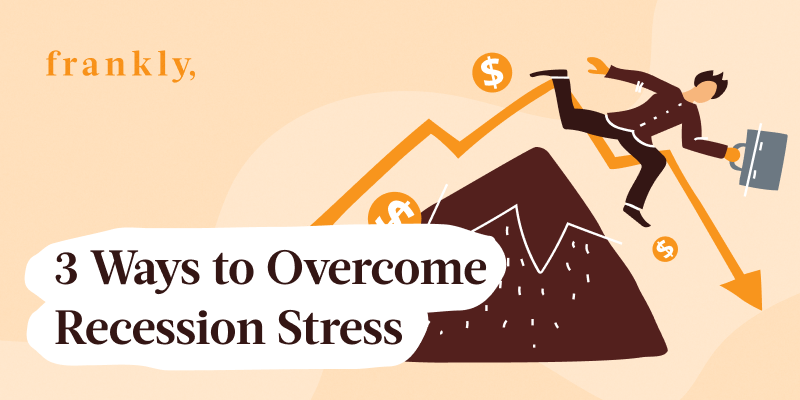3 Ways to Overcome Recession Stress

It’s been a rough few years for many of us, and 2022 has brought an economy that’s not as strong. While economists debate the technical definition of a recession, folks across the country are navigating rising prices, stress, and financial uncertainty.
Economic factors impact our mental health, and it’s important to be aware of the connection. In an economic downturn, it’s normal to feel some uncertainty about what’s coming next. There’s often no clear direction, and no one to ask for answers.
At the same time, financial stress and uncertainty can exacerbate existing mental health conditions like anxiety and depression, or cause new mental health challenges. A tough event, like losing a job, can seem insurmountable when you’re dealing with anxiety, depression, sleep issues, and other issues.
If you’re feeling stuck, down, or overwhelmed by the financial news, there are solutions—and a caring, judgment-free mental health professional can help.
Disengage the doom loop
It’s easy to get caught up in an endless stream of bad news—so easy that you may not even realize that it’s happening. But media outlets tend to prioritize worst-case scenarios, and over-exposure to negative stories can take a toll on your mental health.
A recent study found that news headlines have become more significantly more negative over time. The researchers analyzed tens of thousands of news headlines from 2000 to 2019, and classified these headlines based on their emotional content. Over that time, they found a 104% increase in headlines that convey anger, and a 150% increase in headlines that convey fear. Overall, negative headlines have significantly increased, while positive and neutral headlines have declined.
To gauge where you’re at today, ask yourself: Is the level of concern you’re experiencing about current events proportional, or are you fixated on bad or catastrophic outcomes?
Learning to differentiate between keeping up with current events vs. getting caught in a doom loop is a valuable skill. You may want to set goals for when and how you engage with news content, set limits on screens, schedule time for worry, or schedule time for positivity. It can be helpful to find the ways to disconnect that work best for you.
Reframe your mindset
As financial challenges come up, reframing your state of mind can be a helpful technique. Many people identify with their financial situation, but this can lead to greater feelings of apathy and self-defeat. It’s important to remember that you are much more than your current circumstances.
Reframing helps you change the conversation in your mind—it opens space to see your problem in a new light. For example, a reduction in hours at your job could be causing stress. You might reframe the situation by acknowledging that, yes, this sucks, but you’ve always wanted to write fiction, and this extra time is your opportunity to write short stories and sell them on Amazon. There’s no right or wrong way to do it, and you can play with multiple ways to reframe a situation until you find one that clicks. How could you reframe a stressful situation you’ve recently experienced?
Reframing can shift you from a negative focus, to a positive one. It’s a way of highlighting your strengths, assets, capabilities, achievements, and identifying how they’ll continue to support you on your path. As a tool, it empowers you to take the right next step for you.
Get strategies to surf uncertainty
It can be tough to navigate a weak economy. You may be looking for ways to adjust your lifestyle and personal goals, just when stress is impacting your mental health the most. Sometimes, it feels like too much to juggle.
When finances are tight, self-care often falls by the wayside. But a lack of self-care can negatively impact our professional and personal lives, making the situation worse.
Mental wellness coaching can help. Frankly’s mental wellness Care Guides provide a safe, judgment-free space to share your fears and concerns. As you gain clarity on where you’re at, you’ll get tools that match your needs, and a Journey plan that guides your progress.
Your Care Guide will work with you to find the coping, productivity, and mental wellness strategies that work best for you. These could take many forms–from calming strategies and visualization, to planning out a change in shopping habits, reconnecting with free activities you enjoy, and bringing you back to a sense of empowerment and hope.
No matter what financial challenges you’re facing, your Care Guide will support you with practical, easy-to-learn, effective tools, and gently hold you accountable as you work toward your goals.

Comments ()